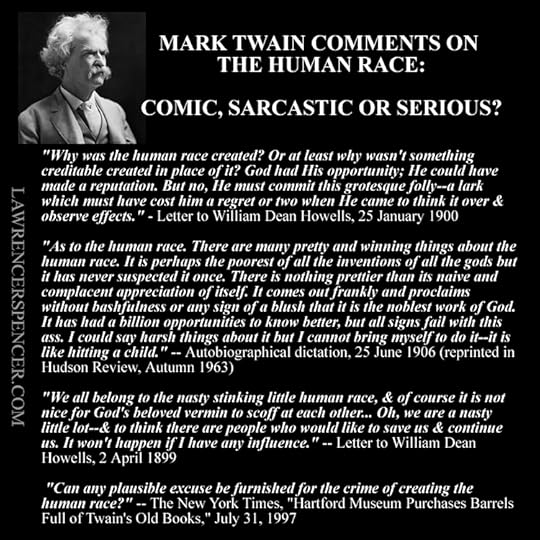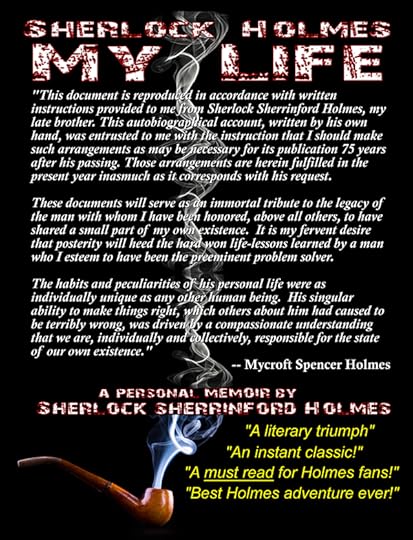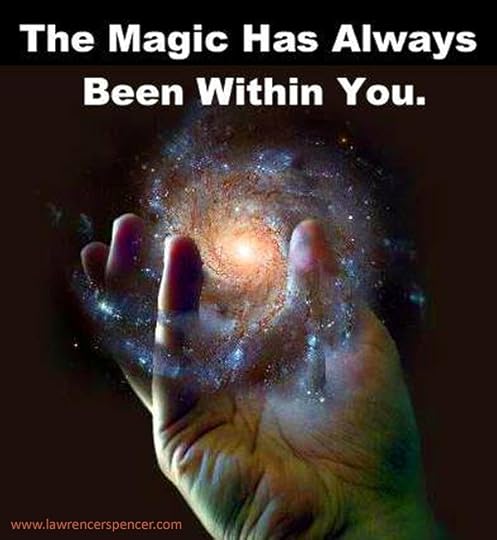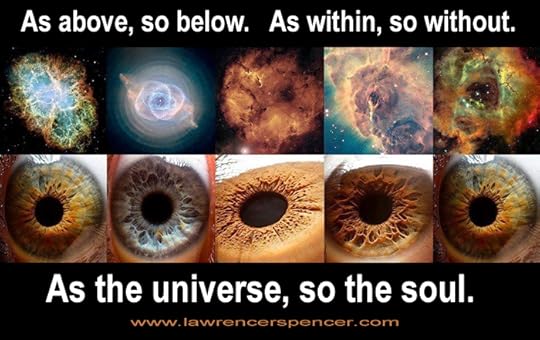Lawrence R. Spencer's Blog, page 342
October 17, 2018
THE MAGIC
The word “magic” derives via Latin magicus from the Greek adjective magikos (μαγικός) used in reference to the “magical” arts of the Persian Magi, or priests of Zoroaster, the god Ahura Mazda.
Dictionary definitions of “magic”:
1) having or using special powers to make impossible things happen or seem to happen
2) having a special quality that makes something seem wonderful
3) Wonderful, amazing or incredible.
Etymology: magic (n.) from Old Persian magush, “to be able, to have power“.
Originally posted 2013-08-21 22:44:39. Republished by Blog Post Promoter
October 15, 2018
FREE AUDIOBOOK
CLICK ON THE LINK BELOW TO LEARN HOW YOU CAN DOWNLOAD A FREE COPY OF ONE OF MY AUDIOBOOKS:
http://www.audible.com/t1/30DayGoldFT_at?source_code=PBRP0389WS110209
 HERE ARE THE LINKS TO MY AUDIOBOOKS ON AUDIBLE.COM YOU CAN DOWNLOAD FREE WHEN YOU BECOME A TRIAL MEMBER OF AUDIBLE.COM:
HERE ARE THE LINKS TO MY AUDIOBOOKS ON AUDIBLE.COM YOU CAN DOWNLOAD FREE WHEN YOU BECOME A TRIAL MEMBER OF AUDIBLE.COM:
SHERLOCK HOLMES: MY LIFE http://www.audible.com/pd/ref=sr_1_1?asin=B00A27BCHG&qid=1355950962&sr=1-1
VERMEER: PORTRAITS OF A LIFETIME http://www.audible.com/pd/ref=sr_1_2?asin=B009NVX2PM&qid=1355950962&sr=1-2
HAPPY LISTENING, MY FRIENDS!
Originally posted 2012-12-19 13:17:36. Republished by Blog Post Promoter
October 14, 2018
REMEMBERING PAST LIFE IDENTITIES
 During the past 10,000 years on Earth the average life span of a human being was between 25 to 40 years of age. That’s assuming that you survived child birth. Infant mortality rates were about 30 percent! To survive to adulthood (14 – 18 years) you had to avoid dying from one hundreds of infectious diseases, starvation, freezing, accidental injuries, wars and plagues. Just as in modern life, 99% of the population are “normal” people, i.e. uneducated peasants, soldiers, workers, homemakers, etc.. Far fewer than 1% were famous persons like kings, pharaohs, Genghis Khan, Shakespeare, Napoleon, or Alexander The Great (who died at the age of 32). So, if you have trouble remembering your IDENTITIES (amnesia) as a human being during the past 10,000 years or more don’t worry about it. Chances are you lived a short, tedious, miserable, painful, illiterate existence and died in anonymity – not very pleasant lives to remember!
During the past 10,000 years on Earth the average life span of a human being was between 25 to 40 years of age. That’s assuming that you survived child birth. Infant mortality rates were about 30 percent! To survive to adulthood (14 – 18 years) you had to avoid dying from one hundreds of infectious diseases, starvation, freezing, accidental injuries, wars and plagues. Just as in modern life, 99% of the population are “normal” people, i.e. uneducated peasants, soldiers, workers, homemakers, etc.. Far fewer than 1% were famous persons like kings, pharaohs, Genghis Khan, Shakespeare, Napoleon, or Alexander The Great (who died at the age of 32). So, if you have trouble remembering your IDENTITIES (amnesia) as a human being during the past 10,000 years or more don’t worry about it. Chances are you lived a short, tedious, miserable, painful, illiterate existence and died in anonymity – not very pleasant lives to remember!
October 12, 2018
THROUGH THE LOOKING-GLASS
October 11, 2018
SEE YOU
October 9, 2018
MARK TWAIN: COMMENTS ON THE HUMAN RACE
 Are the comments made about the human race more than 100 years ago by Mark Twain intended to be humorous, sarcastic or serious?
Are the comments made about the human race more than 100 years ago by Mark Twain intended to be humorous, sarcastic or serious?
Mark Twain (1835 – 1910) was an American writer, humorist, entrepreneur, publisher, and lecturer. Among his novels are The Adventures of Tom Sawyer (1876) and its sequel, Adventures of Huckleberry Finn (1885), the latter often called “The Great American Novel“.
“Why was the human race created? Or at least why wasn’t something creditable created in place of it? God had His opportunity; He could have made a reputation. But no, He must commit this grotesque folly–a lark which must have cost him a regret or two when He came to think it over & observe effects.” – Letter to William Dean Howells, 25 January 1900
“As to the human race. There are many pretty and winning things about the human race. It is perhaps the poorest of all the inventions of all the gods but it has never suspected it once. There is nothing prettier than its naive and complacent appreciation of itself. It comes out frankly and proclaims without bashfulness or any sign of a blush that it is the noblest work of God. It has had a billion opportunities to know better, but all signs fail with this ass. I could say harsh things about it but I cannot bring myself to do it–it is like hitting a child.” — Autobiographical dictation, 25 June 1906
“We all belong to the nasty stinking little human race, & of course it is not nice for God’s beloved vermin to scoff at each other… Oh, we are a nasty little lot–& to think there are people who would like to save us & continue us. It won’t happen if I have any influence.” — Letter to William Dean Howells, 2 April 1899
“Can any plausible excuse be furnished for the crime of creating the human race?” — from The New York Times, “Hartford Museum Purchases Barrels Full of Twain’s Old Books,” July 31, 1997
Originally posted 2017-04-06 22:46:33. Republished by Blog Post Promoter
October 8, 2018
DEFACEBOOK
October 7, 2018
IS-BE

“Personally, it is my conviction that all sentient beings are immortal spiritual beings. This includes human beings. For the sake of accuracy and simplicity I will use a made-up word: “IS-BE”. Because the primary nature of an immortal being is that they live in a timeless state of “is”, and the only reason for their existence is that they decide to “be”.
No matter how lowly their station in a society, every IS-BE deserves the respect and treatment that I myself would like to receive from others. Each person on Earth continues to be an IS-BE whether they are aware of the fact or not.”
— Airl (Officer, Pilot and Engineer of The Domain Expeditionary Force). Excerpted from the book ALIEN INTERVIEW
____________________________________________
VISIT THE WEBSITE and BLOG for the book at www.alieninterview.org and www.alieninterview.org/blog
Originally posted 2013-08-26 13:12:35. Republished by Blog Post Promoter
AS ABOVE, SO BELOW
“As above, so below. As within, so without. As the universe, so the soul.”
~ Hermes Trismegistus ~
∞ ∞ ∞ ∞ ∞ ∞ ∞ ∞ ∞ ∞ ∞ ∞ ∞ ∞ ∞ ∞ ∞ ∞ ∞ ∞ ∞ ∞ ∞ ∞ ∞
The Seven Principles taught by Hermes Trismegistus
These are the seven principles taught by Hermes Trismegistus, also known as * Hermes, the Greek God of travelers/thieves/commerce and the messenger of the Gods. He was also known as the great priest Thoth to the Egyptians.
* (Hermes is an Olympian god in Greek religion and mythology, son of Zeus and the Pleiad Maia. He is second youngest of the Olympian gods. Hermes is a god of transitions and boundaries. He is quick and cunning, and moved freely between the worlds of the mortal and divine, as emissary and messenger of the gods, intercessor between mortals and the divine, and conductor of souls into the afterlife.)
The Seven Principles of the Universe:
1. Principle of Mentalism: “All is Mind”
2. Principle of Correspondence: “As is above, so is below. As is below, so is above.”
3. Principle of Vibration: “Nothing rests; everything moves; everything vibrates.”
4. Principle of Polarity: “Everything is dual; everything has an opposite, and opposites are identical in nature but different in degree.”
5. Principle of Rhythm: “Everything flows, out and in; the pendulum-swing manifests in everything; the measure of the swing to the right is the measure of the swing to the left- rhythm compensates.”
6. Principle of Cause and Effect: “Every cause has its effect; every effect has its cause.”
7. Principle of Gender: “Everything has its masculine and feminine principles.”
Originally posted 2014-03-27 22:11:28. Republished by Blog Post Promoter
October 5, 2018
THE ULTIMATE SHERLOCK HOLMES MYSTERY
 “My dear fellows! How delightful to see you both again. It has been several months since our most recent adventure together, so I surmise, Sherlock, that some new investigation in pressing upon you? Otherwise, I am sure that you would not bother yourself to venture to visit me personally at the club. Any matter of less urgency would certainly be addressed to me by letter, or telegram. Am I not correct?”, said Mycroft, grasping both of our hands in turn with cordiality.
“My dear fellows! How delightful to see you both again. It has been several months since our most recent adventure together, so I surmise, Sherlock, that some new investigation in pressing upon you? Otherwise, I am sure that you would not bother yourself to venture to visit me personally at the club. Any matter of less urgency would certainly be addressed to me by letter, or telegram. Am I not correct?”, said Mycroft, grasping both of our hands in turn with cordiality.
“As always, your observation and supposition are accurate”, I said, confirming what was already obvious to my brother. “However, I assure you than the game that is afoot contains none of the gravity that others I have undertaken”. At this, Mycroft’s expression changed from one of concern to mild interest.
“Please take a seat and explain the particulars to me, if this room is suitable for discussion of details”, he said, waving his hand toward several richly upholstered leather chairs.
Mycroft is heavily built and massive, there was a suggestion of uncouth physical inertia in the figure, but above this unwieldy frame there is perched a head so masterful in its brow, so alert in its steel-gray, deep-set eyes, so firm in its lips, and so subtle in its play of expression, that after the first glance one forgot the gross body and remembered only the dominant mind.
“I cannot think of a more suitable environment in which to discuss the nature of this case than that of a club founded on the philosophical principles of Cynicism”, I told him in a bland matter-of-fact tone.
“Let us fill our pipes”, I said reaching into my pocket for a tobacco poach and briar pipe, “as an explanation of the matter at hand will easily consume our meal time, as well as a portion of the evening. Can a meal be served to us here, if it is not too great an imposition upon your generosity?”, I said as I sat down, ready to share as much information with my esteemed brother as would be necessary to facilitate his analysis of the matter.
“By all means, my dear Sherlock. By all means!”, he said in eager anticipation of a mystery that might divert his attention from an otherwise unfulfilling evening of silent reading at the Club before retiring to his quarters for an equally uneventful night of dreamless sleep.
After recounting the details of my visit with Charles Dodgson and my subsequent invitation to him to dine with us at Baker Street, I summarized the nature of the matter. Mycroft listened attentively while tamping and relighting his pipe several times in order to sustain a satisfactory stream of air through the stem. When I had concluded my account, he raised his eyes to me.
“Well then, let us hear your suspicions, and I will look after the proofs”, said Mycroft.
“In short, my dear Mycroft, it appears that Mr. Dodgson, in league with Mr. Arthur Doyle, are accusing me and therefore all of my associates, of impersonating fictional characters! The assertion is that the stories published by Doyle as magazine serials, or in books, are merely works of his imagination. Moreover, this cad claims that the chronicles of my investigations, which are written by Dr. Watson, are innovations of his own. Can you conceive such a blatantly fraudulent accusation?”, I asked him.
Mycroft stared at me for a moment, and then with a glare turned in his chair and addressed Dr. Watson in an icy tone.
“Dr. Watson”, he said, “it is most obvious that the motivation for this absurd intrigue must begin with you. How is it that Mr. Doyle has come into the possession of your written accounts of the detective cases of Sherlock Holmes, and subsequently published them in his own name?”
— Excerpt from SHERLOCK HOLMES: MY LIFE by Lawrence R. Spencer
Originally posted 2012-11-05 23:30:55. Republished by Blog Post Promoter








